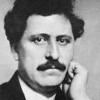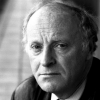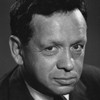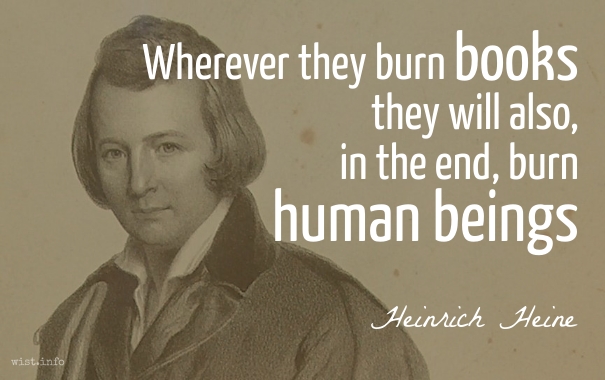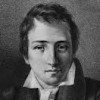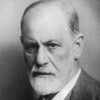Can’t you understand that if you take a law like evolution and make it a crime to teach it in public schools, tomorrow you could make it a crime to teach it in private schools, and tomorrow you may make it a crime to read about it? And soon you may ban books and newspapers. And then you may turn Catholic against Protestant, and Protestant against Protestant, and try to foist your own religion upon the mind of man. If you can do one you can do the other, because fanaticism and ignorance is forever busy and needs feeding.
Nedrick Young (1914-1968) American screenwriter and actor [pseud. Nathan E. Douglas]
Inherit the Wind, film (1960) [with Harold Jacob Smith]
(Source)
The original 1951 play was written by Jerome Lawrence and Robert E. Lee, but does not include this line, delivered in the film by Spencer Tracy. Young and Smith share the screenwriting credits.
Quotations about:
book burning
Note not all quotations have been tagged, so Search may find additional quotes on this topic.
History proves there is no better advertisement for a book than to condemn it for obscenity. Forbidden fruits have unique flavors, and the bounds of suppression create new limits of desire.
Holbrook Jackson (1874-1948) English journalist, editor, author
The Fear of Books, Part 2, ch. 1 (1932)
(Source)
There are worse crimes than burning books. One of them is not reading them.
A Reverend Donald Wildmon in Mississippi heard something on the radio that he didn’t like. Well, Reverend, did anyone ever tell you there are two knobs on the radio? Two. Knobs. On the radio. Of course, I’m sure the reverend isn’t that comfortable with anything that has two knobs on it … But hey, Reverend, there are two knobs on the radio! One of them turns the radio off, and the other one changes the station! Imagine that, Reverend, you can actually change the station! It’s called freedom of choice, and it’s one of the principles this country was founded upon. Look it up in the library, Reverend, if you have any of them left when you’ve finished burning all the books.
I am inordinately proud these days of the quill, for it has shown itself, historically, to be the hypodermic which inoculates men and keeps the germ of freedom always in circulation, so that there are individuals in every time in every land who are the carriers, the Typhoid Mary’s, capable of infecting others by mere contact and example. These persons are feared by every tyrant — who shows his fear by burning the books and destroying the individuals.
Books cannot be killed by fire. People die, but books never die. No man and no force can abolish memory. No man and no force can put thought in a concentration camp forever. No man and no force can take from the world the ideas that embody man’s eternal fight against tyranny of every kind. In this war, we know, books are weapons. And it is a part of your dedication always to make them weapons for man’s freedom.
If these writings of the Greeks agree with the book of God, they are useless and need not be preserved; if they disagree, they are pernicious and ought to be destroyed.
Umar I (c. 583-644) Arab caliph, jurist [Omar, Umar ibn Al-Khattāb, Al-Farooq]
(Attributed)
Ordering the burning of the Library of Alexandria in AD 641, as quoted in Edward Gibbon, The Decline and Fall of the Roman Empire (1776-88). The story is generally considered spurious. More discussion here. Alt. trans.: "They will either contradict the Koran, in which case they are heresy, or they will agree with it, so they are superfluous"
It was a great relief to be in a country where salacious sex literature cannot be sold; where putrid motion pictures and gangster films cannot be shown. The new Germany has burned great masses of corrupting books and magazines along with its bonfires of Jewish and communistic libraries.
What havoc has been made of Books through every Century of the Christian Æra? Where are fifty Gospells condemned as spurious by the Bull of Pope Gelasius. Where are the forty Waggon Loads of Hebrew Manuscripts burned in France by order of another Pope, because suspected of Heresy? Remember the Index expurgatorius, the Inquisitions, the Stake, the Axe the halter and the Guillotine; and Oh! horrible the Rack. This is as bad if not worse than a slow fire.
John Adams (1735-1826) American lawyer, Founding Father, statesman, US President (1797-1801)
Letter to John Taylor (14 Dec 1814)
(Source)
The crime of book purging is that it involves a rejection of the word. For the word is never absolute truth, but only man’s frail and human effort to approach the truth. To reject the word is to reject the human search.
Books won’t stay banned. They won’t burn. Ideas won’t go to jail. In the long run of history, the censor and the inquisitor have always lost. The only sure weapon against bad ideas is better ideas.
Whitney Griswold (1906–1963) American historian, educator [Alfred Whitney Griswold]
“A Little Learning,” speech, Phillips Academy, Andover (1952, Spring)
(Source)
Don’t join the book burners. Don’t think you are going to conceal thoughts by concealing evidence that they ever existed. Don’t be afraid to go in your library and read every book, as long as that document does not offend your own ideas of decency. That should be the only censorship.
Wherever they burn books they will also, in the end, burn human beings.
[Dort, wo man Bücher verbrennt, verbrennt man auch am Ende Menschen.]
Heinrich Heine (1797-1856) German poet and critic
Almansor: A Tragedy, l. 245 (1823)
Alt trans:
- "Where they burn books, at the end they also burn people."
- "Where they burn books, they will also burn people."
- "It is there, where they burn books, that eventually they burn people."
- "Where they burn books, so too will they in the end burn human beings."
- "Where they burn books, they also burn people."
- "Them that begin by burning books, end by burning men."
- "Wherever books are burned, sooner or later men are also burned."
What progress we are making. In the Middle Ages they would have burned me. Now they are content with burning my books.
Sigmund Freud (1856-1939) Austrian psychoanalyst and neurologist
Letter to Ernest Jones (Jan 1933)
(Source)
Regarding Nazi book burnings in Germany. Reprinted in Jones, Sigmund Freud: Life and Work, Vol. 3, Part 1, ch. 4 (1957).


